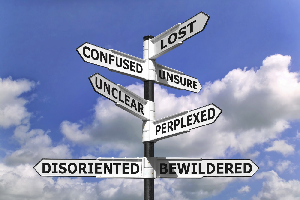
The National Obesity (UK) Forum's Ten Points:
Around the world there are now numerous conferences where health professionals are educating each other about the health value of low-carbohydrate and high-fat diets. The National Obesity Forum (UK), just concluded, is an example. The benefits include; good weight control, stable glucose control for type 2 diabetes, a cure for non-alcoholic fatty liver disease, and we expect many other benefits because metabolic syndrome disappears.
National Obesity Forum's Ten Points
Eating fat does not make you fat.
 |
| Bad Nutritional Information is Confusing |
|---|
This is simple bio-chemistry. Dietary fat's can only become belly fat, if there is a gross excess of glucose in your system. Fat when digested forms free fatty acids, and are normally used as fuel.
In the presence of excess glucose, which is common in modern high carbohydrate diets, glucose is converted into fatty acids, and glucose is used to make glycerol phosphate. That enables the building of the triglycerides that become belly fat. This process is controlled by the hormone insulin. Eat a low-carbohydrate diet that normally keeps insulin turned off.
Saturated fat does not cause heart disease.
Fat does not clog your arteries. Full-fat dairy is likely protective. Butter is much better for you than margarine. Lard which was the fat our grandparents used is 40% saturated fat, and 59% unsaturated fat, and the main fat is oleic acid (44%) the same fat that's in olive oil. There is no correlation between saturated dietary fat and heart disease.
Avoid processed foods labeled "low fat", "lite", "low cholesterol."
These foods will be tasteless unless they are sugar filled in some way. The sugar can be disguised in labels using more than 100 names, for various manufactured carbohydrates, all of which are just sugar.
Limit starchy and refined carbohydrates.
Starchy foods, and manufactured foods, are preferred by retailers because they don't spoil. They are shelf safe. But they are essentially just sugar, and are highly fattening. Breakfast cereals and low fat "slim" crackers are among the worst foods, they are not satiating, and you want more, when you've just had some.
Optimum sugar consumption for health is ZERO.
The sugar industry tries to tell us, that we can eat sugar if we like it. "Sugar is part of a balanced diet," they say, "All we need to do is exercise more." The demand that you must exercise more, comes from industry not from science. Industry wants to maintain sales.
Industrial vegetable oils should be avoided.
Many seed oils from plants that don't seem to be oily, were promoted to lower your heart disease risk by reducing total cholesterol. But these manufactured oils have proven to be harmful to health, and cholesterol turns out to be protective rather than harmful.
Stop counting calories.
You cannot count calories in any sensible way. If you eat only one extra mouthful a day, you'll get fat trying to do that. It's simple: count carbohydrates, roughly is near enough. Control how often you eat. In particular don't eat after your evening meal, until breakfast. Try then to eat a breakfast free of carbohydrates. If in a week or so you are not losing weight, stop cheating, eat less carbohydrate and eat more fat.
You cannot outrun a bad diet.
Despite what the sugar industry says, exercising is not a sensible way to lose weight. The Green Prescription, promoted in New Zealand, is a BAD idea if you are overweight, but it's a GOOD idea once your weight is near normal. The Swedish Experts Committee made it clear in 2013, that exercise has zero or minimal effect on body mass.
Snacking will make you fat.
Each time you snack, you are likely to boost glucose in the blood, and bring insulin into play to remove the excess glucose. That is a normal process, but if insulin is "on" almost all day, because you keep snacking, you damage your homeostatic setting, and eventually you damage your body. Build a long fast into every day. A 14 hour daily fast is easily possible.
Evidence-based nutrition should be incorporated into education curricula for all health care professionals.
The public expects doctors and nurses to know about eating a healthy diet. In fact they usually have very poor knowledge, and most of what they do know is wrong. They will know about the Standard American Diet (SAD), or it's equivalent in your country. Sadly, nutrition professionals are also well trained in using the SAD, and usually know very little about ketogenic diets, and the theory behind them.
John Stephen Veitch